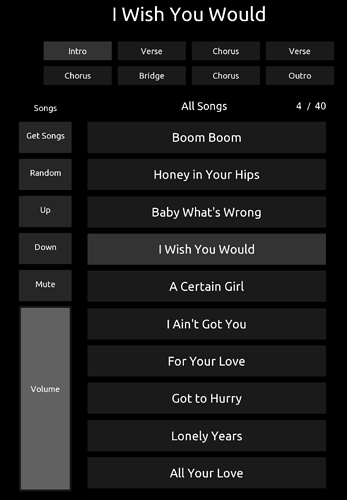I tried to replicate what I did in Open Stage Control. TouchOSC doesn’t have anywhere near the formatting options that Open Stage Control has, but I was able to get the core template replicated.
One thing was that I don’t think TouchOSC can have a scrollable page, so a long song list would have to be split between different pages/tabs.
GP-Setlist.tosc.zip (5.3 KB)
For the scripters, below is an example of the global script I used to manage things like calculating the song counts and song part counts.
-- Callback when an OSC message is received
function onReceiveOSC(message, connections)
-- Parse the OSC message
local path = message[1]
local arguments = message[2]
-- If the setlist changes in GP, request the new song list
if path == '/SetListChanged' then
sendOSC('/SetList/GetSongList')
end
-- Use LUA string functions to extract the song number
-- from the GP SongName message e.g. /SongName9
-- The last message received will provide the total song count
if string.find(path, '/SongName') then
local songCount = tonumber(string.match(path, '%d+')) + 1
-- Store the song count in a label
self.children['SongCount'].values.text = tostring(songCount)
end
-- Get the currently selected song number and store in a label
if path == '/CurrentSongIndex' then
local song = arguments[1].value + 1
-- Rather than set the label directly, you can also trigger
-- a callback for the label and pass it the song count.
-- There is a small script in the CurrentSong label to handle this.
self.notify(self.children['CurrentSong'], tostring(song))
end
-- Once the last song name has been received (and total count
-- is calculated), hide any song labels that aren't required.
if path == '/SongListEnd' then
local songCount = tonumber(self.children['SongCount'].values.text)
-- Iterate through all the song labels in the 'songs' group
-- and set the visibility property. Adding similar controls
-- to a 'Group' gives them an index, which is useful for processing.
for i = 1, #self.children['songs'].children do
self.children['songs'].children[i].visible = (i <= songCount)
end
end
-- Similar to the song count, use LUA string functions to extract
-- the song part number and store in a hidden label.
if string.find(path, '/SongPart%d+') then
local partCount = tonumber(string.match(path, '%d+')) + 1
self.children['SongPartCount'].values.text = tostring(partCount)
end
-- Once the last song part message is received (and total song part
-- is calculated), hide any song part labels that aren't required.
if path == '/SongPartsEnd' then
local partCount = tonumber(self.children['SongPartCount'].values.text)
-- Iterate through all the song part labels in the 'SongParts' group
-- and set the visibility property.
for i = 1, #self.children['SongParts'].children do
self.children['SongParts'].children[i].visible = (i <= partCount)
end
end
end
Oh, and @pianopaul I noticed that they’ve now added Gig Performer to their list of apps 
